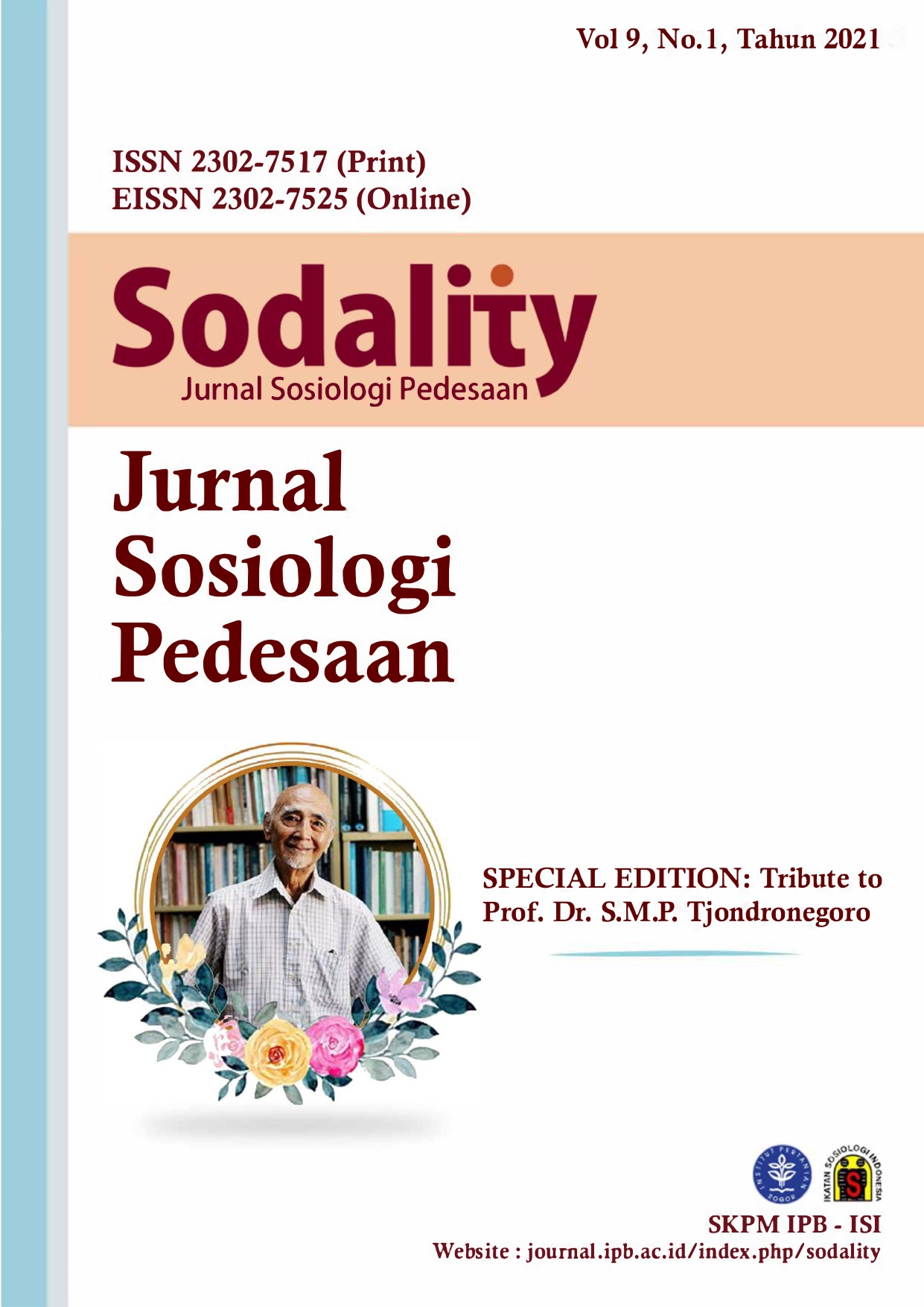The Relevance and Imprint of Professor Tjondronegoro's Thoughts in Rural Sociology
Abstract
Rural Sociology Education in Indonesia is the “academic arena" by Late Prof. Dr. S.M.P. Tjondronegoro. This paper aims to show the academic arena of the deceased as a media for institutionalizing and developing social science, especially in the Field of Sociology and Applied Anthropology with a focus on organizing village development. With a systematic review method, document review, and interviews with selected alumni from the Postgraduate Study Program (Master and Doctor degree) of Rural Sociology (SPD), Department of Community Development Sciences, Faculty of Human Ecology, Bogor Agricultural University, it was noted that the curriculum of this study program is rooted and grew from the thoughts of the deceased. In fact, the subjects taught by the deceased with others SPD founders, namely the deceased Prof. Sajogyo and the deceased Prof. Pujiwati Sajogyo were continuously developed, until now they have become various subjects and elements of the three specialization of students from the SPD Study Program at the Master degree. The three specializations are (1) Community Development, (2) Agrarian Studies and Political Ecology, and (3) Digitalization of Villages and Social Change. The common thread of the thought of the deceased to link these three specializations is the thought of sodality which is the root of the village in managing sustainable development.
References
Beer, R. B. and D. (2013). Rethinking Space: Urban Informatics and the Sociological Imagination. In The Palgrave Macmillan Digital Sociology (Kate Orton). Palgrave Macmillan.
Castells, M. (2010). The Rise of the Network Society Second edition. Wiley Blackwell Publication.
Deborah Lupton. (2015). Digital Sociology. Routledge.
Evans, K. (2013). Rethinking Community in the Digital Age? In The Palgrave Macmillan Digital Sociology. Palgrave Macmillan.
Farid, H. (2014). Rewriting the Nation: Pramoedya Ananta Toer and the Politics of Decolonization Disertasi Ph.D. National University of Singapore.
Farid, H. (2017). Agenda Dekolonisasi Kebudayaan Nasional dalam Perspektif Ki Hadjar Dewantara. Abad Jurnal Sejarah, 1(1).
Fontaine, M. R. and D. (2018). Sustainable Community Development and the Green Economy: Ensuring a Strong Sustainability Approach. In B. M. and R. P. (Ed) Sue Kenny (Ed.), The Routledge handbook of community development : perspectives from around the globe. Routledge.
Inet.detik.com. (2020). Riset: Ada 175,2 Juta Pengguna Internet di Indonesia. https://inet.detik.com/cyberlife/d-4907674/riset-ada-1752-juta-pengguna-internet-di-indonesia
Jan A.G.M.van Dijk. (2013). Inequalities in the Network Society. In The Palgrave Macmillan Digital Sociology. Palgrave Macmillan.
Kelly Hamshaw, Shoshanah Inwood, J. K. and M. N. (2018). The Role of Community Engagement and Indicators Generating Knowledge for Informing Regional Planning for Sustainability. In The Routledge handbook of community development : perspectives from around the globe. Routledge.
Kitchenham, B. (2004). Procedures for Performing Systematic Reviews. Keele University.
Kolopaking, L, M. (2008). Kecamatan Untuk Kesejahteraan Rakyat. Departemen Sains Komunikasi Pengembangan Masyarakat Press.
Kolopaking, L, M. (2014). Kebijakan Ruang Membangun Kawasan Perdesaan Partisipatif.
Kolopaking, L, M. (2017). Village to develop and to Develop cooperation among villages sustainable in digital era for Strethening Village Competitiveness. “Policy Intervention of Development Village Competiveness.”
Kolopaking, L, M. (2020). Pembelajaran tentang Tata-kelola Alih Teknologi dan Pembiayaan Pedesaan Pada Era Digital.
Maschab, M. (2013). Politik Pemerintahan Desa di Indonesia. Pusat Antar Universitas UGM.
Mosco, V. (2017). Society Now Becoming Digital Toward a Post-Internet Society. Emerald Publishing Limited.
Prior, K. O.-J. and N. (2013). The Palgrave Macmillan Digital Sociology. Palgrave Macmillan.
Rhode, R. A. . (2014). Network Governance and the Differentiated Polity Selected Essays, Volume I. McGrow-Hill.
Sajogyo. (2004). Dari Praktek ke Teori dan Ke Praktek yang Berteori.
Satria, A. (2021). Modernisasi Ekologi dan Ekologi Politik: Perspektif Baru Analisis Tata Kelola Sumber Daya Alam (SDA). Orasi Guru Besar Institut Pertanian Bogor.
Schwab, K. (2016). The Fourth Industrial Revolution. World Economic Forum.
Singleton, E. G. and C. (2013). ‘Gendering the Digital’: The Impact of Gender and Technology Perspectives on the Sociology Imagination. In The Palgrave Macmillan Digital Sociology. Palgrave Macmillan.
Tjondronegoro, S. M. . (1979). Tata Desa dan Kelembagaan dalam Pembangunan Daerah Pedesaan. Pusat Penelitian dan Pengembangan Departemen Dalam Negeri RI.
Tjondronegoro, S. M. . (1984). Social Organizatiom and Planned Development in Rural Java. Oxford University Press.
Tjondronegoro, S. M. . (1986a). Masalah Transformasi Indonesia dari Tahap Agraris ke Era Industrialisasi. Lembaga Penelitian Sosiologi Pedesaan.
Tjondronegoro, S. M. . (1986b). Menghadapi Alih Teknologi di bidang Pangan Menjelang Repelita V. Dalam Fauzan Djamal dan Sofwan Samandawai (Penyunting). In Negara Agraris Ingkari Agraria: Pembangunan Desa dan Kemiskinan di Indonesia. AKATIGAS.
Tjondronegoro, S. M. . (1990). Kemiskinan dan Kesenjangan di Tengah Pertumbuhan 1990. Jurusan Sosial Ekonomi Fakultas Pertanian IPB.
Tjondronegoro, S. M. . (1996). Suasana Keprihatinan Mengiringi Masyarakat Kita Memasuki Era Globalisasi. Panel Ekonomi KOMPAS.
Tjondronegoro, S. M. . (2005). Rural Development and Rural Poverty Reduction : Promises Between Fisrt UN Development Decade and Millenium Development Goal 1960-2005. UN ESCAPE.
Zainuddin, S. (2009). Sosiologi Pedesaan Sebagai Ilmu Pengetahuan. Academia FISIP Untad, 1. https://media.neliti.com/media/publications/28563-ID-sosiologi-pedesaan-sebagai-ilmu-pengetahuan.pdf
Authors who publish with this journal agree to the following terms:
- Authors retain copyright and grant the journal right of first publication with the work simultaneously licensed under a

This work is licensed under a Creative Commons Attribution 4.0 International License. that allows others to share the work with an acknowledgement of the work's authorship and initial publication in this journal. - Authors are able to enter into separate, additional contractual arrangements for the non-exclusive distribution of the journal's published version of the work (e.g., post it to an institutional repository or publish it in a book), with an acknowledgement of its initial publication in this journal.
- Authors are permitted and encouraged to post their work online (e.g., in institutional repositories or on their website) prior to and during the submission process, as it can lead to productive exchanges, as well as earlier and greater citation of published work (See The Effect of Open Access).





.png)









